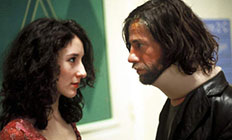|
|
|
|
Head-On
|
 |
|
It
has been called, a little crudely, the nuts-in-love genre: two mentally
disabled, drug-addicted or alcoholic people whose sudden, explosive encounter
and subsequent relationship adds up to a true tale of surrealist-style amour fou.
It’s
a very modern genre, passing through Robert Rossen’s Lilith (1964), the post-Nouvelle Vague
classic Les Amants du Pont-neuf (1991) and Australia’s Angel Baby (1995) – but Fatih Akin’s Head-On (not to be confused with Ana Kokkinos’ Head On, 1998)
stirs a particularly potent brew by adding extra ingredients to the formula.
First,
the union starts on a decidedly mock, non-fou note, as a marriage of
convenience between two people on the bottom rung of society: Cahit (Birol Ünel)
has smashed his car, Sibel (Sibel Kekilli) has slashed her
wrists. Yet, as Sibel asserts her desires by prowling
the local clubs and bars, Cahit becomes increasingly
jealous and violent – and then love, in however perverse or clumsy a way,
asserts itself.
Second,
Akin complicates everything by making this the story of Turkish immigrants in
Germany, suffering racism and abuse in the course of their negotiation of two
very different cultures.
Yet
this is not, in any strict sense, a social-realist film. Akin’s choice of music – he in fact diverted much of the small budget towards securing
rights to the chosen songs – is itself a cheeky, riotous blast of
multiculturalism, assembled with the assistance of Alexander Hacke (member of the legendary German avant-garde outfit Einstürzende Neubauten): 1980s
fare like Depeche Mode, Talk Talk, Sisters of Mercy
and Wendy Rene mixed with Brechtian tableaux of
performed folk music to mark the stages of the plot …
This
music – reinforced by the wild, rough-edged lyricism of the acting, staging and
hand-held camera movements – takes us beyond the strict confines of the social
problem film, as well as overdetermined notions of
cultural identity.
A
nervy, unsettling, sometimes bleak drama of two outsiders (vividly played, with
unwavering intensity and conviction, by Unel and Kekilli), Head-On in fact continues a vital strand of provocative, post-punk creativity in
contemporary European cinema – a vitality from which even Akin’s subsequent films (Crossing the Bridge [2005], The Edge of Heaven [2007] and
the awful Soul Kitchen [2009]) have
shied away.
© Adrian Martin April 2008 / December 2009 |
![]()